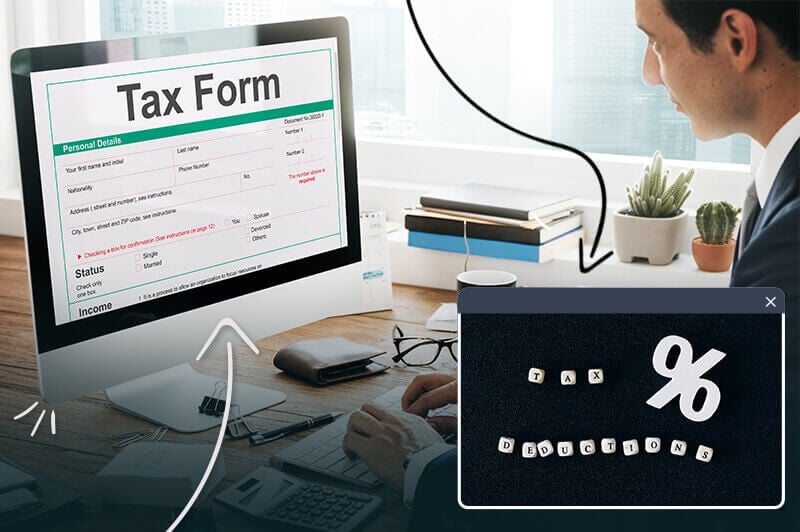Taxes. We pay them, but honestly, other than that, most of us don’t know much about them. But when you start your own business, it’s something you need to learn because you’ll need to file business taxes (which are local, state, and federal taxes a business owner is required to pay—including income tax, payroll taxes, licenses, and permits, etc.)
Owning a business comes with expenses—it’s something you can’t avoid. But the federal government lends a hand to taxpayers (a person who pays taxes) by allowing you to reduce the income you pay tax on. In other words, it helps you save money (and who doesn’t like to save money?).
But I’m just scratching the surface here. In this article, you’re going to learn how to write off your business expenses to help you save money on taxes.
What Is a Tax Write-off?
A “tax write-off” is the unofficial term for a tax deduction—I’ll be using these terms interchangeably.
A tax deduction is a business expense that you can claim to help lower your taxable income (the income that can be taxed). A tax write-off can be partially or fully deducted from your taxable income, reducing how much money you owe the government.
If, after filing your taxes, you’re owed a tax refund, the government will refund you back the amount of tax you overpaid based on your tax liability (the amount of taxes an individual, business, or organization owes the local, state, and federal government). But if you still owe the government money, tax write-offs can help lower the bill.
How Do Business Tax Deductions Work?

Good question! Tax write-offs can include deductions, credits, or expenses that you can claim on your taxable income. The Internal Revenue Service (IRS) collects and enforces tax laws.
You can file your tax return to the IRS on your own by filling out the necessary forms, or you can hire an accountant to file your taxes for you.
When filing your tax return, the IRS takes your reported income and subtracts your tax write-offs and credits to see what tax bracket you are in. The tax bracket you’re in determines the tax rate in which your taxable income will be taxed.
There are various factors that affect a small business’s tax rate, such as state tax laws, and the type of business structure you have (sole proprietorship, LLC, partnership, etc). So, it’s important to do some basic research (or consult an accountant) on your state tax laws to find out your business’s tax rate.
What Is the Benefit of a Tax Write-Off?
You may be wondering if it’s really worth your time to write-off some of your expenses. And the answer is yes. Of course, it’s always nerve-wracking when doing something for the first time, but remember, with time it’ll get easier.
The benefits of a tax write-off can significantly help your small business. Tax write-offs can reduce your taxable income, which means you can owe less money to the government. And that is the biggest benefit when writing off your business expenses.
Who Can Write-off Business Expenses?
Is everyone eligible for tax write-offs? The answer is yes. Individuals, self-employed, small businesses, and corporations are allowed to write-off business expenses.
What’s important is to understand your business structure (sole proprietorship, partnership, LLC, etc.) so you can know which expenses to deduct.
What Can Be Written off as a Business Expense?

Not everything can be written off as a business expense. But here are the common expenses you can deduct. Just remember, if you’re unsure about an item, ask an accountant or consult the IRS website.
Advertising and promotion: You can fully deduct all expenses related to promoting your business. This includes print and digital advertising, web design, business cards, and maintenance.
Business insurance: You can deduct your business insurance on your tax return. If you have a home office or use an area of your home to run your business, you can deduct your renter’s insurance.
Business meals: You can deduct 50% of food and drink purchases. The meals need to be related to your business and you need to document the date and location of the meals, the business relationship with the people you dined with, and the total cost of the meal.
Charitable donations: You can deduct charitable donations from qualifying organizations.
Child and dependent care: Costs for caring for children or adult dependents are deductible. If your own children are twelve and under, you can write off the costs related to their care.
Client and employee entertainment: If you take your business clients out, you can deduct the expense as long as you discuss business during the event. You can deduct 50% of the entertainment expenses and 100% of the social events held for employees.
Depreciation: Items that reduce in value over time. You can deduct its depreciation from your taxes. It can include buildings, vehicles, furniture, equipment, machinery, copyrights, computer software, and patents.
Education: Any educational expenses that bring value to your business are fully deductible. This can include seminars, webinars, books, courses, and classes related to your business.
Energy efficiency expenses: Any upgrades to your home to make it more energy-efficient can qualify for tax credits. If you have alternative energy equipment for your home, you can claim 30% of the cost. This includes wind turbines, solar panels, and solar water heaters.
Investments: If you’ve borrowed money to make investments, you can write off the interest paid on the loan.
Medical expenses: You can deduct insurance premiums and medical care expenses. It includes doctor’s fees, home care, and prescription drugs.
Mortgage interest: You can deduct interest payments towards your mortgage to buy or improve your home if your home is used for business purposes.
Moving expenses: If moving is work-related, you may be able to deduct the moving costs. For this, you need to pass the distance test.
Office supplies: You can write off your supplies, including computers, printers, software, pens, paper, postage, and shipping costs. Keep all the receipts.
Phone and internet expenses: You can deduct your phone and interest expenses if it’s integral to your business. If you use your phone and internet for personal and business, you can only write off the percentage used for business.
Professional service fees: This includes legal, accounting, and bookkeeping services (including any bookkeeping software used). You can look at the guidelines for legal and professional fees here.
Real estate taxes: Taxes at the state and local levels can be deducted.
Rent expenses: If you rent or lease an office space, you can deduct the amount you pay for rent.
Retirement plan contributions: If you pay into an Individual Retirement Account, it can help reduce your taxable income.
Salaries and benefits: If you have any employees, you can write off their salaries, benefits and vacation pay. To write off salaries, and benefits, the employee cannot be a sole proprietor, partnership, or LLC in the business; the salary is necessary and reasonable, and the services delegated to the employee were provided.
Startup expenses: If you’re starting a new business, you can deduct as much as $5,000 in startup expenses. This includes costs related to marketing, travel, and training.
Vehicle expenses: If your car is strictly for work, you can write it off and all costs associated with operating it. If your vehicle is a mix between work and personal use, you can only deduct the costs related to business usage.
Work-related travel expenses: All expenses related to business travel can be written off. This includes hotels, rentals, dry cleaning, airfare, hotels, and car expenses (check the IRS website for the list and rules of work-related travel expenses).
What Can’t Be Written off as a Business Expense?

Not everything is a business expense (sadly). There are some expenses your business may have that do not qualify as a tax write-off. Here are some expenses you can’t write-off:
- Child support
- Alimony paid on divorce agreements entered into after Dec. 31, 2018 (for those in the United States)
- Political contributions
- 529 contributions (may be deductible on a state tax return)
- Roth IRA contributions
There are also other deductions. For example, while medical and dental expenses may be deductible, cosmetic surgery is generally not included (however, there are exceptions).
Additionally, while charitable donations are deductible, you cannot deduct donations given to individuals.
Tricky Tax Deductions to Keep In Mind
When writing-off taxes, it’s not so cut and dry. Here are some expenses that are deductible but come with specific conditions:
Home office: Your home office is tax-deductible if you have a dedicated space in your home where you conduct your business. When deducting home expenses like rent, mortgage interest, utilities, or property taxes it needs to be based on the square footage of space dedicated for your home office. The IRS currently allows you to use the simplified home office deduction which is up to $1,500 (up to 300 square feet at $5 per square foot), depending on how much square footage your home office uses.
Home office computer: If your computer is a household item and not solely used for the business, you will need to calculate the percentage of time you use the computer solely for your business.
Guard dog: A guard dog is a qualified business expense, but only if you deduct the time they’re spending to guard your business.
Uniform or costume: If your uniform or costume is something you can wear outside of your job, then it shouldn’t be written off. However, if your uniform can only be worn for your job, it qualifies as a tax write-off.
If you’re unsure about tax deductions in your state, check the government website for more information.
Over to You
The thing with taxes is that it’s fluid—things change. Before doing your taxes, it’s important to review what you’re allowed to deduct.
If you’re feeling a little overwhelmed, don’t worry! Consult a bookkeeper or hire an accountant to do your taxes for you.
What’s important is to give yourself time to learn about filing taxes and make sure you file them before the deadline (which is generally April 15th of each year, but double-check!).
